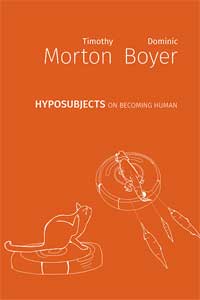hyposubjects: on becoming human
by Timothy Morton and Dominic Boyer

- CCC2 Irreversibility
- Published: 2021
- ISBN: 978-1-78542-096-2
- PDF ISBN: 978-1-78542-095-5
The time of hypersubjects is ending. Their desert-apocalypse-fire-and-death cults aren’t going to save them this time. Meanwhile the time of hyposubjects is just beginning. This text is an exercise in chaotic and flimsy thinking that will possibly waste your time. But it is the sincere effort of two reform-minded hypersubjects to decenter themselves and to help nurture hyposubjective humanity. Here are some of the things we say in this book: 1) Hyposubjects are the native species of the Anthropocene and are only just now beginning to discover what they might be and become. 2) Like their hyperobjective environment, hyposubjects are also multiphasic and plural: not-yet, neither here nor there, less than the sum of their parts. They are, in other words, subscendent (moving toward relations) rather than transcendent (rising above relations). They do not pursue or pretend to absolute knowledge or language, let alone power. Instead they play; they care; they adapt; they hurt; they laugh. 3) Hyposubjects are necessarily feminist, colorful, queer, ecological, transhuman, and intrahuman. They do not recognize the rule of androleukoheteropetromodernity and the apex species behavior it epitomizes and reinforces. But they also hold the bliss-horror of extinction fantasies at bay, because hyposubjects’ befores, nows, and afters are many. 4) Hyposubjects are squatters and bricoleuses. They inhabit the cracks and hollows. They turn things inside out and work miracles with scraps and remains. They unplug from carbon gridlife; they hack and redistribute its stored energies for their own purposes. 5) Hyposubjects make revolutions where technomodern radars can’t glimpse them. They patiently ignore expert advice that they do not or cannot exist. They are skeptical of efforts to summarize them, including everything we have just said.
Author Bios
Dominic Boyer is a writer, media maker and anthropologist. He currently teaches at Rice University where he also served as Founding Director of the Center for Energy and Environmental Research in the Human Sciences (2013-2019). His most recent book is Energopolitics (Duke UP, 2019), which is part of a collaborative duograph, “Wind and Power in the Anthropocene,” with Cymene Howe, which studies the politics of wind power development in Southern Mexico. With Howe, he also helped make a documentary film about Iceland’s first major glacier (Okjökull) lost to climate change, Not Ok: a little movie about a small glacier at the end of the world (2018). In August 2019, together with Icelandic collaborators, Boyer installed a memorial to Okjökull’s passing, an event that attracted media attention from around the world. He is pursuing anthropological research with floodies in Houston, Texas, and on electric futures across the world. And he is developing a TV series, Petropolis, about relations and reckonings in Houston TX.
Morton is the author of the libretto Time, Time, Time (opera by Jennifer Walshe, 2019), and of numerous artworks including We Are the Asteroid (with Justin Guariglia, 2019); Come Fast from the Dark (with Andrew Melchior, 2024); and This Huge Sunlit Abyss From The Future Right There Next To You (with Björk, 2015). In 2018 Morton co-wrote and appeared with Jeff Bridges in Living in the Future’s Past, directed by Susan Kucera. Morton is Rita Shea Guffey Chair of English at Rice University.
Morton has written Hell: in Search of a Christian Ecology (Columbia, 2024), All Art Is Ecological (Penguin, 2021), Spacecraft (Bloomsbury, 2021), Being Ecological (Penguin, 2018), Humankind: Solidarity with Nonhuman People (Verso, 2017), Dark Ecology: For a Logic of Future Coexistence (Columbia, 2016), Nothing: Three Inquiries in Buddhism (Chicago, 2015), Hyperobjects: Philosophy and Ecology after the End of the World (Minnesota, 2013), Realist Magic: Objects, Ontology, Causality (Open Humanities Press, 2013), The Ecological Thought (Harvard, 2010), Ecology without Nature (Harvard, 2007), 8 other books and 300+ essays on philosophy, ecology, literature, music, art, architecture, design and food. More at Timothy Morton.
